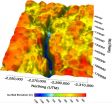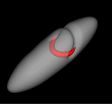(Press-News.org) Fish can live in almost any aquatic environment on Earth, but when the climate changes and temperatures go up many species are pushed to the limit. The amount of time needed to adjust to new conditions could prove critical for how different species cope in the future, reveals a new study from researchers at the University of Gothenburg, published in the scientific journal Proceedings of the Royal Society B.
Climate change continues apace thanks to increasing levels of greenhouse gases in the atmosphere. The greenhouse effect has led not only to an increase in average temperatures but also to more extreme weather conditions, such as major heatwaves.
More than just survival
In contrast to birds and mammals, fish are ectothermic, which means that their body temperature fluctuates in line with the temperature of their surroundings. Fish that live at different temperatures can generally do so because they are able to optimise their bodily functions to that particular temperature. Changes in the ambient temperature can therefore disrupt this balance.
"Previous research has focused almost exclusively on whether different species will be able to survive an increase in temperature or not," says Erik Sandblom, researcher at the University of Gothenburg's Department of Biological and Environmental Sciences. "We were interested in finding out how species that survive actually manage to do so, how long it takes and the limitations they have to contend with during the acclimation period."
Most vulnerable during the first few weeks
In the published trial the researchers simulated a temporary heatwave and then monitored how the physiology of the shorthorn sculpin, a common marine bottom-dwelling fish species, was affected. The results show that during the first week of the heatwave the fish were severely restricted and were forced to forego high-energy processes such as eating or swimming in order to survive.
"During the first few weeks of a sudden heatwave the fish do survive but are vulnerable to events that would otherwise pass without problem. Dealing with extra challenges such as escaping from predators or coping with disease can be fatal."
Amount of time decisive
The trial took eight weeks and the results show that the physiological load reduces with each passing week as the fish gradually manage to reset their bodily functions and acclimate to the new environment. The results also show that the "cost" to the fish correlates closely with how long it takes to adjust. In a future that is both warmer and more variable, it is therefore likely to be important not only to adjust to new conditions, but to do so quickly.
INFORMATION:
The research was carried out with: Michael Axelsson, Albin Gräns and Henrik Seth at the University of Gothenburg.
Link to abstract: http://rspb.royalsocietypublishing.org/content/281/1794/20141490.abstract
Contact:
Erik Sandblom
Researcher at the Department of Biological and Environmental Sciences
Tel: +46 (0)31 786 4548, +46 (0)703 286 358
E-mail: erik.sandblom@bioenv.gu.se
Shape up quickly -- applies to fish, too!
2014-09-30
ELSE PRESS RELEASES FROM THIS DATE:
Dietary polyunsaturated fatty acids linked to smaller risk of coronary heart disease
2014-09-30
A recent study completed at the University of Eastern Finland shows that dietary polyunsaturated fatty acids may reduce the risk of coronary heart disease. The sources of polyunsaturated fatty acids include fish, vegetable oils, and nuts. The findings were published in Arteriosclerosis, Thrombosis & Vascular Biology, an esteemed journal of the American Heart Association.
Recent studies have not found an association between the consumption of saturated fats and the risk of cardiovascular diseases. It seems that the mere reduction of saturated fats from the diet does not ...
On the trail of the truffle flavor
2014-09-30
This news release is available in German. FRANKFURT. Truffles, along with caviar, are among the most expensive foods in the world. Because they grow underground, people use trained dogs or pigs to find them. But the distinctive smell of truffles is not only of interest to gourmets. A group of German and French scientists under the direction of the Goethe University Frankfurt have discovered that the smell of white truffles is largely produced by soil bacteria which are trapped inside truffle fruiting bodies.
White truffles from the Piedmont region in Italy can reach ...
NASA ocean data shows 'climate dance' of plankton
2014-09-30
The greens and blues of the ocean color from NASA satellite data have provided new insights into how climate and ecosystem processes affect the growth cycles of phytoplankton—microscopic aquatic plants important for fish populations and Earth's carbon cycle.
At the bottom of the ocean's food chain, phytoplankton account for roughly half of the net photosynthesis on Earth. Their photosynthesis consumes carbon dioxide and plays a key role in transferring carbon from the atmosphere to the ocean. Unlike the plant ecosystems on land, the amount of phytoplankton in the ocean ...
NASA support key to glacier mapping efforts
2014-09-30
Thanks in part to support from NASA and the National Science Foundation, scientists have produced the first-ever detailed maps of bedrock beneath glaciers in Greenland and Antarctica. This new data will help researchers better project future changes to glaciers and ice sheets, and ultimately, sea level.
Researchers at the Center for Remote Sensing of Ice Sheets, or CReSIS, at the University of Kansas in Lawrence, Kansas, recently built detailed maps of the terrain beneath Greenland's Jakobshavn Glacier and Byrd Glacier in Antarctica. The results of this study were published ...
NASA-funded rocket has 6 minutes to study solar heating
2014-09-30
On Sept. 30, 2014, a sounding rocket will fly up into the sky – past Earth's atmosphere that obscures certain wavelengths of light from the sun -- for a 15-minute journey to study what heats up the sun's atmosphere. This is the fourth flight for the Very high Angular Resolution Ultraviolet Telescope, or VAULT, will launch from the White Sands Missile Range near Las Cruces, New Mexico.
The instrument, now called VAULT2.0, has been refurbished with new electronics and an imaging detector to capture images more frequently than before. While in space, VAULT2.0 will observe ...
Deceptive-looking vortex line in superfluid led to twice-mistaken identity
2014-09-30
So long, solitons: University of Chicago physicists have shown that a group of scientists were incorrect when they concluded that a mysterious effect found in superfluids indicated the presence of solitons—exotic, solitary waves. Instead, they explain, the result was due to more pedestrian, whirlpool-like structures in the fluid. They published their explanation in the Sept. 19 issue of Physical Review Letters.
The debate began in July 2013, when a group of scientists from the Massachusetts Institute of Technology published results in Nature showing a long-lived structure ...
New discovery approach accelerates identification of potential cancer treatments
2014-09-30
ANN ARBOR—Researchers at the University of Michigan have described a new approach to discovering potential cancer treatments that requires a fraction of the time needed for more traditional methods.
They used the platform to identify a novel antibody that is undergoing further investigation as a potential treatment for breast, ovarian and other cancers.
In research published online in the Proceedings of the National Academy of Sciences, researchers in the lab of Stephen Weiss at the U-M Life Sciences Institute detail an approach that replicates the native environment ...
Gene doubling shapes the world: Instant speciation, biodiversity, and the root of our existence
2014-09-30
What do seedless watermelon, salmon, and strawberries all have in common? Unlike most eukaryotic multicellular organisms that have two sets of chromosomes and are diploid, these organisms are all polyploid, meaning they have three or more sets of chromosomes—seedless watermelon and salmon have 3 and 4 sets of chromosomes, respectively, and strawberries have 10! While this might seem surprising, in fact most plant species are polyploid. Polyploidy, or genome doubling, was first discovered over a century ago, but only recently, with the development of molecular tools, has ...
Smithsonian scientists discover coral's best defender against an army of sea stars
2014-09-30
Coral reefs face a suite of perilous threats in today's ocean. From overfishing and pollution to coastal development and climate change, fragile coral ecosystems are disappearing at unprecedented rates around the world. Despite this trend, some species of corals surrounding the island of Moorea in French Polynesia have a natural protector in their tropical environment: coral guard-crabs. New research from the National Museum of Natural History's Smithsonian Marine Station scientist Seabird McKeon and the museum's predoctoral fellow Jenna Moore of the Florida Museum of Natural ...
Asthma symptoms kicking up? Check your exposure to air pollution
2014-09-30
ARLINGTON HEIGHTS, Ill. (September 30, 2014) – People who suffer from asthma may think there's not a lot they can do to control their asthma besides properly taking medications and avoiding allergic triggers.
According to a new article in the Annals of Allergy, Asthma and Immunology, the scientific publication of the American College of Allergy, Asthma and Immunology (ACAAI), asthma sufferers can learn lessons about managing their asthma by examining their lifestyle. The woman described in the Annals article improved her asthma once she and her doctor determined her ...





